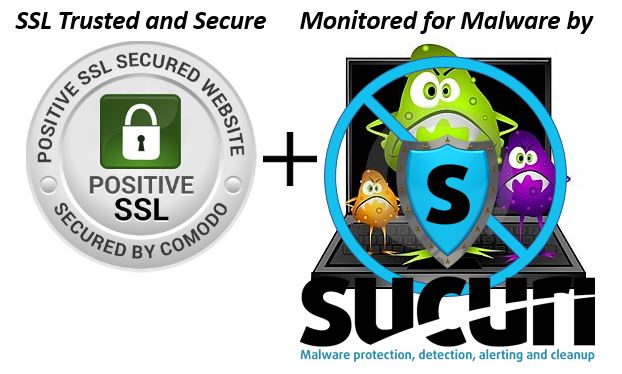UPDATE – Since doing this article, I’ve added another one about commercial security solutions – “Internet Security Solutions – A Commercial Look” – CLICK HERE to read it.
This past September, Microsoft released a free Internet security suite called Microsoft Security Essentials (you can download it from here). The free download replaced a pay-for subscription-based antivirus service called Windows Live OneCare and another free anti-spyware program called Windows Defender, giving PC users a combination of antivirus and antimalware in one package. All that Microsoft required was that your copy of Windows be legitimate.
Other commercial antivirus companies, like Norton, McAfee, and Kaspersky waved off the free security program as inferior. But soon after it was released, favorable reviews from such sources as PC World and PC Magazine began surfacing, and now Microsoft’s program has been accepted as another viable, free, solution, along with the likes of AVG (free.avg.com), avast!(www.avast.com/free-antivirus-download), PCTools Free Antivirus (www.pctools.com/free-antivirus), and AdAware Free (www.lavasoft.com).
But this raises a big question, especially with many of our students. Are the free Internet security programs as good as the commercial ones? What’s the catch? Do I dare entrust the protection of my computer to a free program?
The companies that provide free solutions (except for Microsoft), also provide pay-for Internet security programs that they hope you will upgrade to. If you take the time to carefully look at their “comparison” charts, you’ll see that in most cases, the free programs give you what THEY call “basic anti-virus and anti-malware protection“. This seems to mean that the programs will in fact protect you from the main threats, viruses and malware, but do not include such things as:
- technical support (which you probably won’t contact anyway)
- fast definition updates (do we really care how long updates take to download?)
- a firewall (Windows XP, Vista, and 7 already give you that)
- parental control (why do we need that?)
- backup and recovery services (from an Internet security program? I thought backup programs did that.)
- antispam (that’s an email thing, isn’t it?)
- antiphising (another email thing)
You may have noticed that I was being a big cynical in the above list. But please don’t get me wrong. Some of those features are actually useful to some Internet users. But to be totally honest, for most of the folks we work with, the free Internet protection is all they need. That’s why we recommend programs like AVG, and now Microsoft Securiity Essentials to many of our students, and why a good number of them have been using those services for years.
So, to come back to the original question, “Are the free Internet security programs as good as the commercial ones?”, I’d have to say “No, BUT for most normal Internet users, they are plenty good enough”.
Now, before I kick the commercial programs clear out the window, let me be totally transparent with you. I don’t use the free programs on my own computers. Instead, I use a geeky antivirus/antispyware program called EST NOD32 (www.eset.com). But keep in mind that part of what I do for a living is download and test tons of software so that I can pass along the information to my students, and that most of my computers are used for video production work, a very computer resource intensive thing. I use NOD32 because it has a very small footprint (i.e. does not take much in the way of computer resources) and it has a great reputation for catching viruses in the wild.
So ultimately, the choice of using a free or commercial security solution is up to you. But as you make your decision, keep in mind that there’s no reason to be hesitant about the free programs. For most folks, they’ll do the job just fine.
BTW, leave a comment below and let us know what antivirus program you use, and what you think of it. We would love to hear what you think!
ANOTHER UPDATE – Last week, with my NOD32 Antivirus subscription running out, I installed a copy of Norton 360 v. 4.0 on three of my computers at home.
Why you might ask? Well, on Black Friday this past fall, I picked up a 3-user copy of the software for just $19.95 at Office Max. Couldn’t pass up that deal. And although I STILL believe that for a lot of regular computer users, the free anti-virus solutions will work just fine, I’d also say that if you can find a great deal like this on a commercial program, $20 is worth paying.
Now, as far as Norton 360 goes… to be honest, it as way too much “stuff” for my tastes. As a Norton user from way back in the DOS days (I even met Peter Norton at a conference back in the mid 1980’s), I’ve used their antivirus solutions off and on for years. In the early 2000’s, I stopped using their Internet programs because they had become bloated and resource intensive. Then in 2008, I began hearing good things about them again after Symantec (the company that owns Norton) did a complete re-write of the software. Still, at this point I already had NOD32 and could see no reason to make a change.
But now that I have I’ll have to say that I’m happy with the anti-virus and anti-spyware protection the program affords, but really don’t have much use for all the other stuff (online backup, firewall, identity theft protection, pc tuneup).
Now, that’s not to say that a typical computer user wouldn’t find all these extras helpful. It’s just that I handle all of the other tasks beyond basic anti-virus and anti-spyware by myself, using other software.








I always used Norton 360. I would love to save the money it costs, yet I may not feel safe without it …? I wonder, should I try it …?
Dorothy… thanks for the post.
I think a lot of folks feel the way you do. They want to save the $39 they spend every year, and yet don’t want to take the chance of getting infected because they are using a “lower-quality” antivirus solution. I think in the past, you WERE taking a chance with an antivirus freebee… but I don’t think so anymore.
The way I look at it, the companies that are producing the free programs also have pay-for programs they want you to buy. Wouldn’t they look foolish if their free programs were letting all kinds of viruses through? And wouldn’t that reflect very poorly on their pay-for programs.
So I think most “normal” Internet users will be perfectly fine with the free programs.
Still… it boils down to YOU having to be comfortable with your choice. And that comfort might well be worth the $39 you pay.
Take care… and thanks again for posting.
I have Microsoft Security Essentials and last week my machine contracted a horrible virus. I took it to Office Depot. They think McAfee is the best. Now I have also installed Sophos and that’s an anti-malware. I’m not sure if I need to get an Antivirus or not — ??
Hi MaryLu – Sorry it took so long to reply to this. With regards to the various antivirus and security solutions, a key thing to remember is that you only need ONE antivirus program on your computer, and in fact, having more than one can cause issues. It’s a bit different with anti-spyware programs, but since most good antivirus programs now also cover the “bad” spyware (malware), you really only need the single program for the bad stuff.
Most retail stores, and salespeople, will have a favorite antivirus that they like. McAfee is good, as is Norton, as is Kaspersky, as is Panda, as is… etc. When you go with commercial programs, this day and age, you can’t really go wrong. You can always find folks who’ve had terrible experiences with one program or another, or who swear by one or another.
One thing to also consider… if you are a Cox subscriber, they have a free Internet security package you can download. I know that in past years they’ve had McAfee, but I’m not sure what they are using now.
And finally, always keep in mind that there is no such thing as a “perfect” security solution. As good as all these programs are, viruses and malware can still infect you, if you are not vigilant and careful (i.e. don’t open email with attachments from folks you don’t know, don’t download programs from places you’ve never heard of, etc.).
It true that many a times before opting for a antivirus or firewall people have many questions like to which antivirus to opt for free or paid, will it protect my computer from web threats or not and more. However, personally I had very bad experience with software antivirus so in order to get complete web security, I had installed hardware firewall along with software antivirus. This firewall protects my computer from all web threats.
http://www.watchguard.com
Hey Kalven: Good point about upping your security with a hardware solution. It’s certainly true that “software” security solutions can cause computer issues, especially with older machines and programs that hog a lot of resources. And I think that’s where hardware solutions like the products that WatchGuard offer really come in handy. Of course, the thing to keep in mind is that WatchGuard is primarily targeting businesses with their products, and so are bit more expensive to implement ($250 and up). And their major projection (as you mention) is to act as a firewall (with packet inspection) which prevents external threats (hackers and such). You would still need a good antivirus program in addition to this hardware firewall solution.
John, I use Avast Pro (paid) on one computer and the free version on another. As far as I know, the difference between the two is the amount of control given to you. In the five or so years I since I installed Avast, it was defeated once and required professional help. It’s caught two viruses on its own.
Gunter… thanks for the comment. Yes, I think in most cases the difference between a companies pay-for and free programs is (1) the amount of support and (2) the amount of customization and control you have. For a lot of folks, control is not an issue… since they just want it to work without a lot of fiddling. But not having the support that the pay-for products includes could be an issue.
But glad that the Avast programs seem to be working, at least pretty well. for you.
I use the paid Kaspersky, BUT I got a 100% rebate from Staples when I purchased it. Prior to that I was using their 30 day trial version and just reloading it every 30 days….a hassle yes but I do trust their program(s). I don’t know if Staples is still offering a rebate on the purchase or not. It took about 5 weeks to get the rebate back, but no hassle in getting it or cashing the check.
Roger… I used Kaspersky on a couple of my computers a few years ago, when I got a “reviewer” copy as I was writing a review on anti-virus programs for a magazine. In the year I used it, the program worked well. And I know that lately, they’ve had some really good reviews from some of the big online tech sites and magazines.
But you bring up a really good point in what you say above… someone in the market for an internet security program should carefully watch the papers. Office Depot, Office Max, Staples, Best Buy, etc. all use discounts on these programs to get you in the store. You should never have to pay “full” price… since if you are patient, you can usually get some great rebates and discounts on them. As I mentioned in the blog, I got Norton 360 for $19.00 during Black Friday.
For years, I used Norton/Symantec virus and Internet protection in various configurations, such as Norton’s 360, AntiVirus, Internet Security, and the Systemworks suite. However, I have had a few bad experiences with Norton. Although the virus protection was acceptable, it was very processor intensive, and it totally crashed at least three times. After one failure, although I am no novice user, I had to contact tech support to help me remove and reinstall it, a process that, including wait time to talk with someone, took several hours.
After the third failure, I uninstalled it and used the free version of “avast! Internet Security” until I trusted it. I then purchased the full version and I have been quite pleased with its performance.
Until recently, I used SuperAntiSpyware because someone recommended it. In fact, SAS claims it catches not only the easy ones, but removes the difficult ones as well. However, I read somewhere that it does not live up to its advertising; it doesn’t even get the easy ones. So, I supplement avast! with Malwarebytes Anti-Malware and other free malware tools.
No mention was made of Bit Defender, how is that rated against Norton and McAfee which is the one I recently bought. On my laptop that died after 5 years usage, I used Bit Defender.
Hi there…
Because it’s such a wide-spread issue, the world of anti-virus and Internet security solutions has grown by leaps and bounds the past few years. So there are now lots of solutions beyond what I talk about here.
Although I don’t have direct experience with Bit-Defender, I know folks that use it and like it, and I’ve never read anything negative.
In fact, in their 2014 review of security solutions, PC Magazine gave Bit-Defender an Editors Choice ranking. CLICK HERE to read the article.
The bottom-line is… as long as you go with a reputable (one you’ve heard of before) Anti-virus program, you’ll be safe.
Thanks for the post!
John Lortz